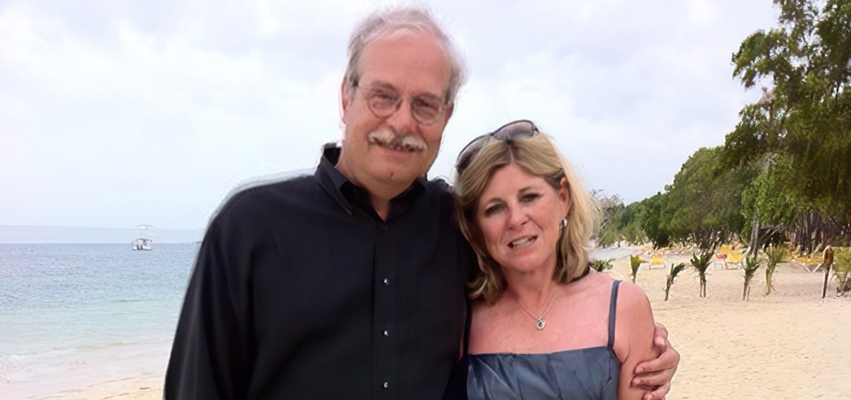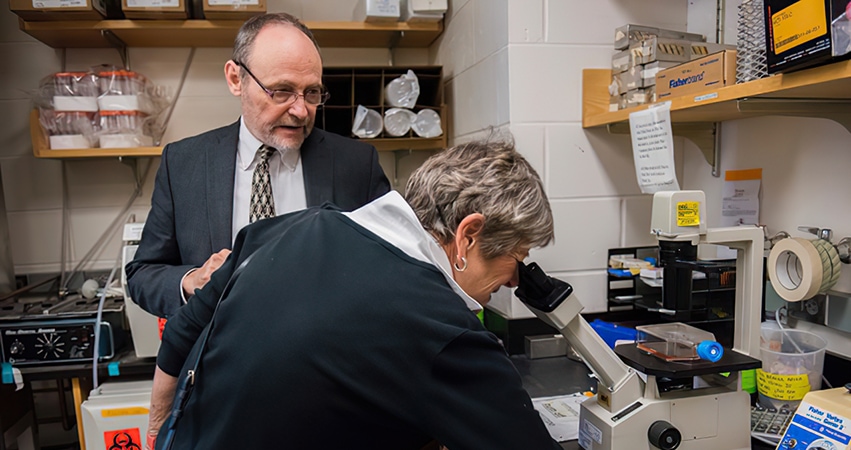Hope. Our sister never—not for one minute—lost hope. March 15, 2021 marked the third anniversary we remembered our sister, Diane Redington, who lost her courageous three-year battle to gynecologic carcinosarcoma (GCS/MMMT).
Posthumously named as one of Peoria High’s 2018 distinguished alumnae for her personal and professional achievements, Diane was devoted to the field of healthcare. With two master’s degrees, Diane served her adopted hometown of Pittsburgh, Pennsylvania as a nurse/nurse practitioner and held management positions at several local and national healthcare organizations. One of her greatest accomplishments was starting a free clinic for the uninsured population in the Catholic Archdiocese of Pittsburgh.
Diane was diagnosed in April of 2015. Not one to concede to defeat, she refused to accept her terminal diagnosis, and instead began searching for a solution. Traveling extensively to interview physicians from major cancer centers across the United States, she quickly learned that no clinical trials existed, as GCS/MMMT is considered a rare cancer. Yet this was not a deterrent to her; it proved to be a greater challenge that she was committed to overcoming. In her own words, Diane viewed her rare cancer diagnosis as “a problem to be solved.”
A Cancer Warrior
Through her personal journey, Diane discovered only a smattering of websites offered support for women with carcinosarcoma—a critical void. Guided by her strong sense of community service, she envisioned an online hub for patients and their advocates to learn more about the disease, clinical trial opportunities, and how to advocate for their medical needs and collectively fight for a cure—a place for best practices and best wishes alike.
With the support of her family and friends and a heart full of hope, the tenacious 63-year-old wife and mother decided to focus all her energy, knowledge and resources—along with her supportive husband Roy Buchta, son Matt, six siblings and friends—on finding a cure. Diane founded The GCS Project, a tax-exempt interactive digital platform to provide hope, critical support and education, backed by state-of-the-art medical information. She was thoroughly committed to women with GCS and their families who contacted her, promptly returning emails, offering emotional support and guidance, and instructing them on self-advocacy, while at the same time valiantly fighting her own insurmountable battle.
Our sister best expressed her mission: “I want our website, The GCS Project, to be a place of hope and help. It will take a community of people to make this happen. My dream is to harness the power of the people I love, the women who are affected by this disease, and the medical community to discover the next game-changing breakthrough to cure gynecologic carcinosarcoma.”

Making a Difference
Diane worked tirelessly to find a cure. She knew that funded research and projects on the horizon would lead to amazing developments toward eliminating carcinosarcoma—and that these discoveries likely would help other rare cancers as well. “In initiating our research to treat and cure this rare gynecologic cancer, we may find the key to solving a variety of ovarian, uterine and fallopian tube cancers,” she explained. “We can’t stand still.”
In three intense years, Diane pioneered world-class research that continues today at the University of Arkansas School for Medical Sciences (UAMS), University of Alabama at Birmingham (UAB) and Massachusetts General Hospital. According to Diane’s physician, Michael Birrer, MD, PhD, who now serves as vice chancellor and director of the Winthrop P. Rockefeller Cancer Institute at UAMS, The GCS Project funded a major molecular characterization of MMMT tumors.
“[These] efforts… have led to a complete sequencing of DNA and RNA on macrodissected sections of this tumor,” Dr. Birrer explains. “Early analysis shows that the DNA mutations are similar in both the carcinoma and sarcoma portions of the tumor, while the RNA expression data is quite different. This is a major finding which explains the pathologic appearance of the tumor. We suspect this analysis will identify new and important therapeutic targets for MMMT tumors. Diane continues to make a difference.”
Outreach Acknowledged
In 2017, after The GCS Project had raised more than $350,000 towards research on GCS/MMMT cancer, Massachusetts General Hospital Cancer Center honored Diane as a “100 Everyday Amazing Individual.” That same year, she was honored with a Spotlight Award from LiveBetterWith, acknowledging remarkable people around the world who are living with cancer. In 2018, Diane and The GCS Project funded research for the world’s first clinical trial to treat GCS/MMMT cancer at the O’Neal Comprehensive Cancer Center in Birmingham.
Diane’s family and friends carry on her vision to give help and hope. To date, The GCS Project has raised more than $800,000, and 98 percent of funds are directed toward cutting-edge GCS/MMMT research. Through the power of The GCS Project website and the lives Diane continues to touch, top researchers are poised to begin new studies to find a cure for this cancer. From Peoria to Pittsburgh and now worldwide, Diane’s legacy lives on.PM
Visit gcsproject.org for additional resources and information on current research efforts.




